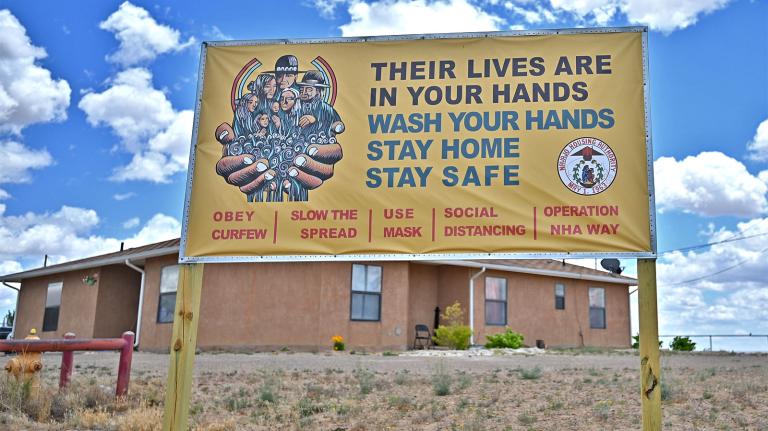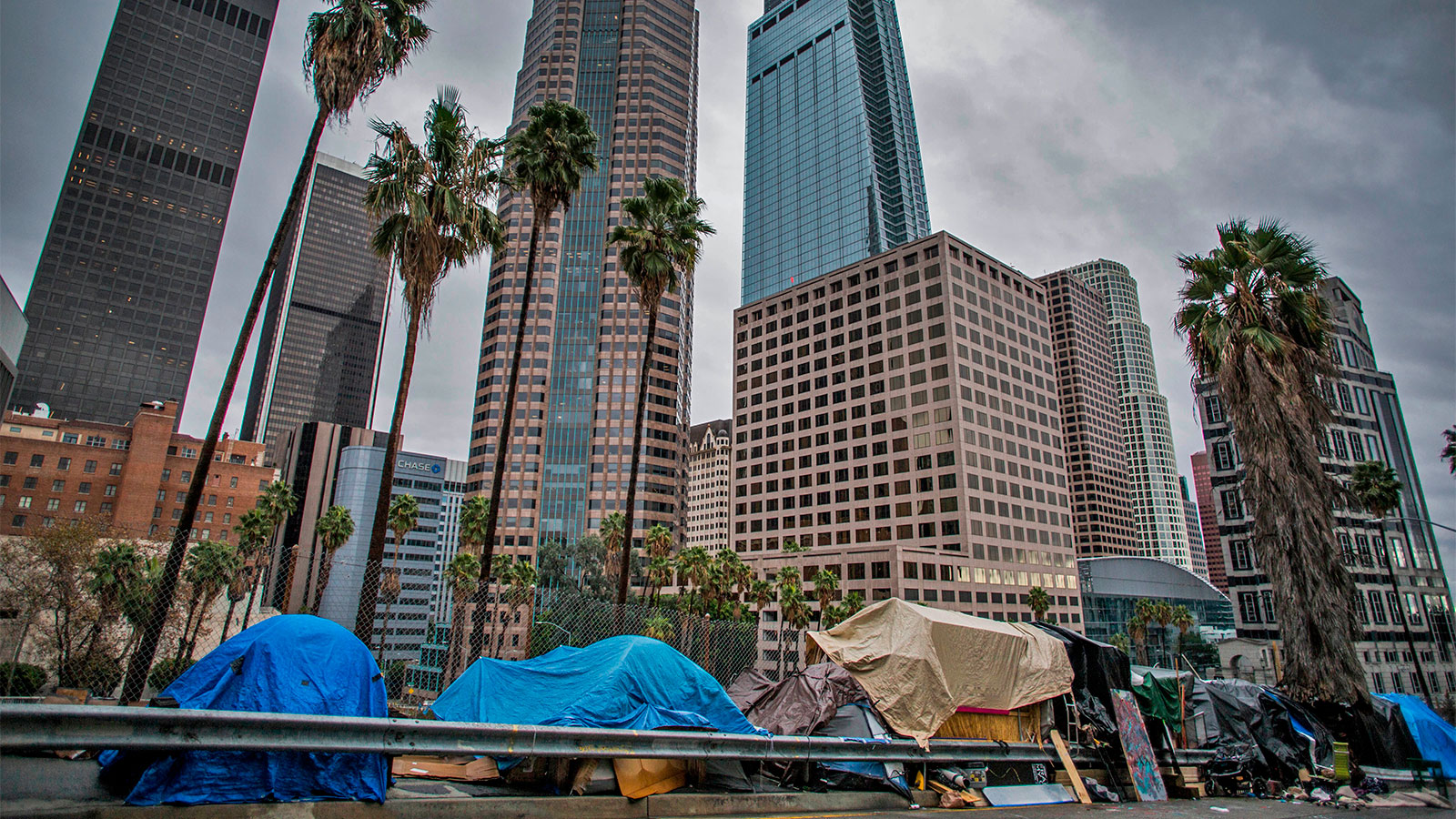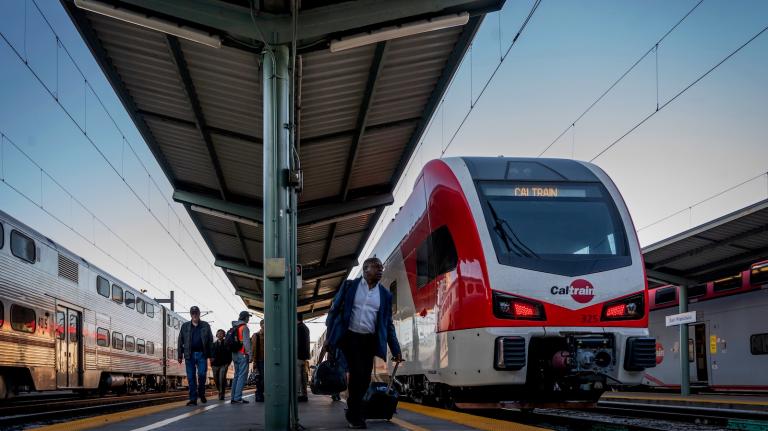Hotels don’t want to shelter homeless people. Advocates say it shouldn’t be a choice.
COVID-19 has had a devastating effect on Southern California’s longstanding housing woes. Since the start of the pandemic, Los Angeles County’s homeless population has ballooned to around 66,000 — an especially concerning fact considering that people without housing are much more likely to contract and die from the disease. At the same time, only 42 percent of the region’s hotel rooms are occupied, leaving roughly 50,000 rooms sitting empty on any given day.
That contradiction did not escape the notice of California Governor Gavin Newsom, who announced last April that he had secured funding from the Federal Emergency Management Agency to help shelter individuals in unoccupied hotel rooms statewide. In Los Angeles, the goal was to use the program, dubbed “Project Roomkey,” to shelter a quarter of the county’s homeless population. But nearly one year later, the city has largely failed to get people off the streets and out of the way of the virus, partially due to hotels’ reluctance to participate in the FEMA-backed program.
Now, some activists say it is time for the city to use the funding to “seize” every unoccupied hotel room, leasing them using FEMA reimbursements earmarked to house individuals without shelter during the pandemic.
“The issue is [not] having people in our political system who are bold enough and courageous enough to make those decisions and listen to the people,” said Joanna Swan, a member of the “Seize the Hotels” campaign and an organizer with the housing rights group Street Watch L.A. “These options are allegedly open to us, but all we see is more investment in maintaining death, poverty, or the criminalization of our most vulnerable.”
According to Los Angeles city data based on a snapshot from the end of February, Project Roomkey was sheltering about 1,600 individuals in hotels — significantly fewer than the 15,000 people identified by the Los Angeles Homeless Services Authority as being especially vulnerable to COVID-19 because of their age or preexisting medical conditions. Even at the program’s height, it was only leasing around 3,500 rooms (sheltering around 4,300 individuals). Meanwhile, in January, Angelenos without housing died at a rate of five a day, a 74 percent increase compared to the same time last year.
Since taking office, President Joe Biden has increased coverage for the program federally, promising to fully reimburse cities for their homeless-to-hotel costs through September. But Los Angeles officials say the slow pace of the payback process, which requires municipalities to front millions of dollars for a year or longer, is a major deterrent to Project Roomkey’s success. Officials also say the city hasn’t yet received any FEMA funds for the roughly $59 million it has spent so far on the project. But according to the L.A. Times, that is because the Mayor’s office hasn’t sent in a single reimbursement request. (The L.A. Mayor’s office did not respond to Grist’s request for comment.)
Advocates say stigma around homelessness also plays a big role in the program’s failures. Take King County, Washington, for example, which has the third-largest homeless population in the country. It reached an agreement with a local hotel to help curb COVID-19 by getting over 200 people off the streets and into unoccupied rooms. But the county’s efforts were met with resistance from suburban residents and even local officials, who complained about additional security measures and property damage. This schism ultimately led to the program being thrown out and the hotel occupants having to be relocated.
“Unfortunately, we have worked very diligently in the mainstream media to demonize unhoused people as others or as violent or they deserve to be criminalized and thrown in jail just for being unhoused,” said Theo Henderson, a community activist and “Seize the Hotels” supporter who runs a podcast chronicling his experiences living on L.A. streets.
The stigma of homelessness doesn’t just make it hard for people experiencing it to secure hotel rooms. Last April, for example, just weeks after Governor Newsom announced the new street-to-hotel push, two Los Angeles Police Department officers were called to a fence outside a church parking lot in the Boyle Heights neighborhood to check out a possible case of trespassing. A man had been allegedly sleeping in a makeshift structure in the parking lot. As the officers approached the man, some onlookers from across the street grabbed their cell phones and began to film the encounter.
In theory, a lot of things could have happened next. The officers could have asked the unhoused individual to leave. Or pointed him to a contact for Project Roomkey. Instead, according to the cell phone video, one of the officers did what activists say is a too-common event: beat the shit out of him.
According to a 2019 LAPD report, roughly one-third of the times an officer used force against a suspect, the victim was an unhoused person. And even after the start of the pandemic, several city council members introduced a law to lock up homeless people who camped out on certain streets. “We have been asking for tangible humane solutions to the housing crisis for years,” said Henderson. “And the city’s response to those requests has been criminalization and demonization.”
Advocates have spent months trying to improve Project Roomkey, and want the city to make it a permanent option to help with Los Angeles’s housing crisis. “Not only do we need this now, but we need it in the future,” Henderson said. “Homelessness is very directly impacted by climate change, especially in Los Angeles and around the port. We’re the ones that have to deal with the air and ground pollution that others can escape by entering their homes. It’s only going to get worse.”
Studies have shown that air pollution disproportionately impacts people who live outdoors. Those individuals are also more likely to live on or near sites with soil and water contamination that are prone to severe weather events, fire, and pests. Severe weather events also pose a major threat to those without shelter. Even in sunny Los Angeles, more people experiencing homelessness have died from hypothermia in recent years than in New York City and San Francisco combined. Noise pollution is also a health and environmental hazard that can result from constant police interactions, often in the middle of the night.
“Seize the Hotels” proponents say the city’s inefficient rollout of the FEMA-funded program is partially to blame for an estimated 7,000 cases of COVID-19 — a result of unsafe living conditions and police raids on homeless encampments. In addition to asking officials to seize unoccupied hotel rooms, advocates are calling on the city to redirect funding from its police budget to focus on housing people.
“Homelessness isn’t just some grand spectacle that happens overnight,” said Swan of Street Watch L.A. “This is systemic and constantly ongoing.”




